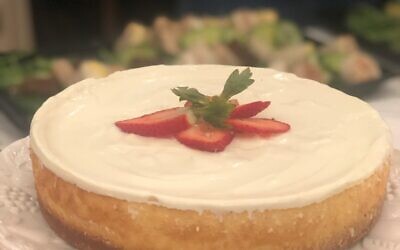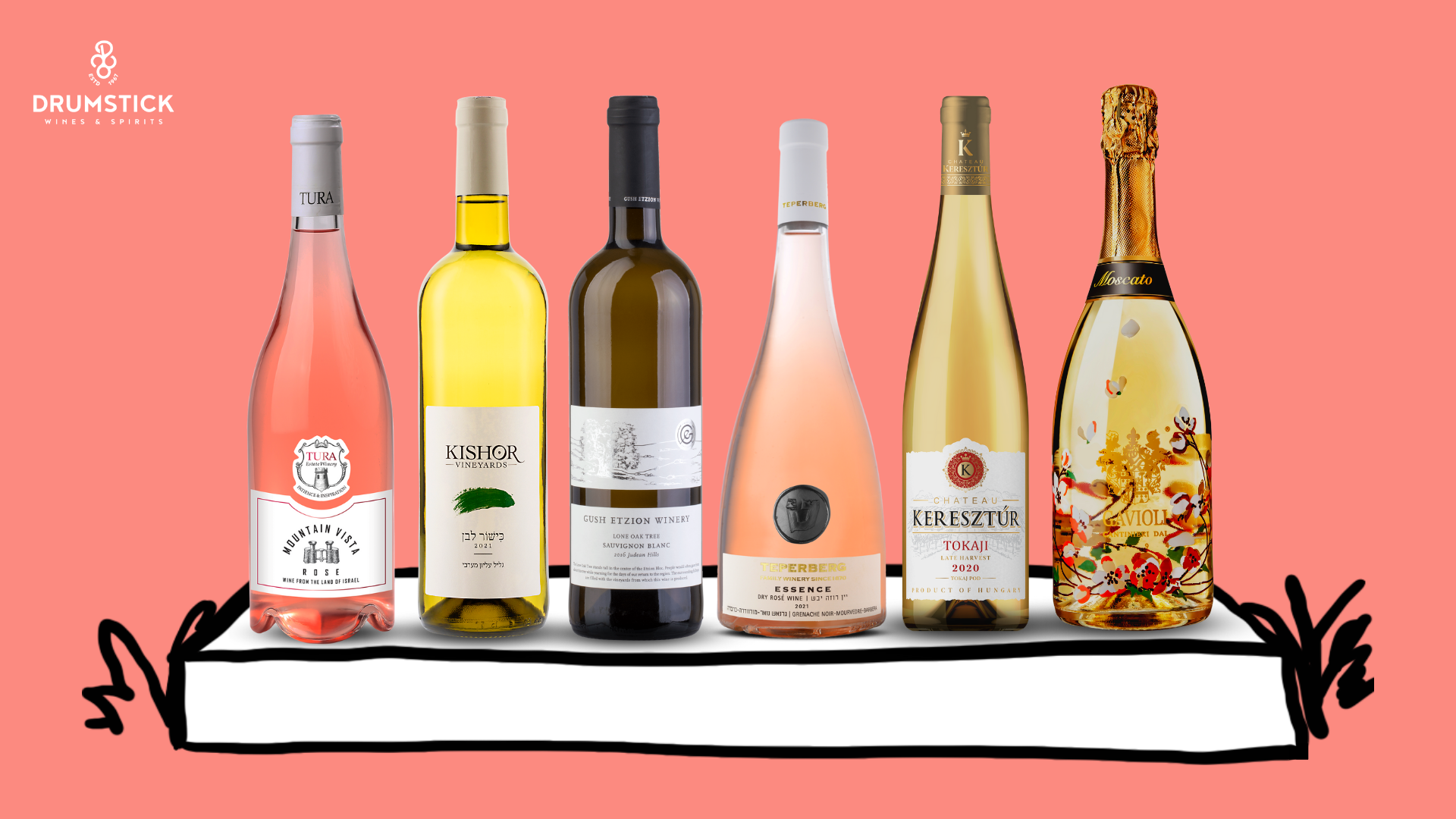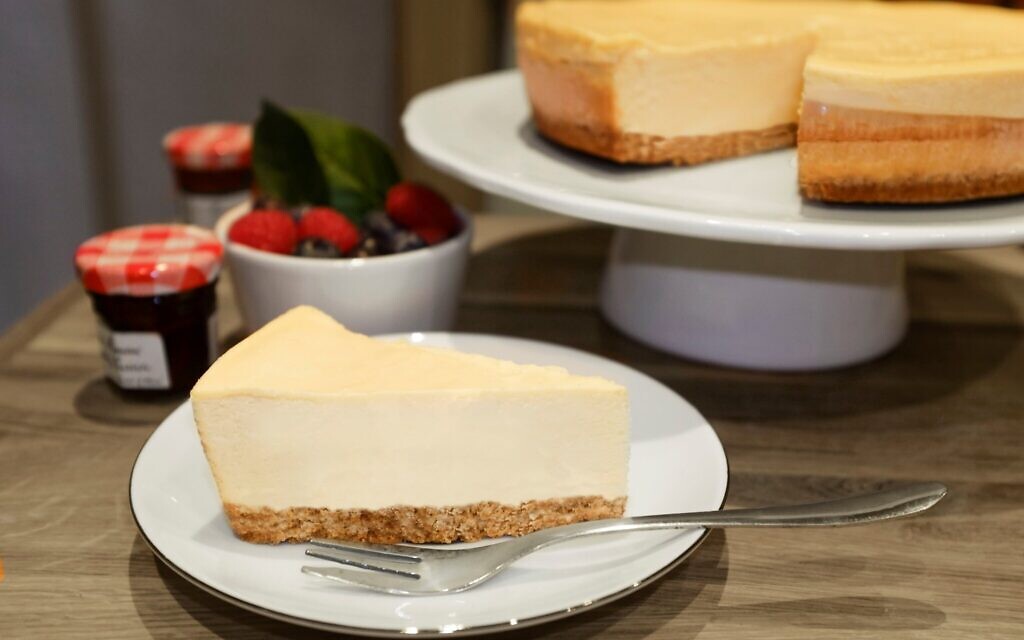Cheesecake is not just for Shavuot
Whether you bake it or buy it, on Shavuot you can have your cheesecake and eat it. But have you ever wondered how or why?
Over 4,000 years ago, in the fifth century BC, the ancient Greeks on the island of Samos created the earliest-known cheesecake. It was made with patties of fresh cheese that were pounded smooth with flour and honey and baked on an earthenware griddle. It was considered a great source of energy and was served to athletes during the first Olympic Games in 776 BC.
Joan Nathan, author of the Jewish Holiday Cookbook (1988), states that cheesecake as we know it today was originally created in the Middle East by placing sour cream in a bag that was hung, allowing moisture to drain from the substance so that it would dry to form a curd. It was then mixed with honey, lemon peel, egg yolks and more sour cream, and baked into a cake. She cites the crusaders in the spread of this dessert, claiming they returned to Europe with the idea in the 12th and 13th centuries.
During the late medieval ages in Europe, cheesecake transformed to include a pastry base. The first English cookbook, written in 1390, included multiple variations of the cheesecake recipe that included eggs.
Get The Jewish News Daily Edition by email and never miss our top stories Free Sign Up
The idea of a cheese-based cake landed in America with immigrants, however, the recipes for New York style-cheesecake — dense, moist, sweet and made with cream cheese rather than curd cheese — didn’t come about until the 1870s. It was around this time that William Lawrence, a dairy man in upstate New York, developed modern cream cheese while trying to make a French soft cheese This later became known as Philadelphia Brand Cream Cheese.
Nathan explains that cheese curd was carried to Russia by the Mongols in the 13th century and was embraced by the Jewish community there. Russian Jews used the curd to prepare cheesecake, and later they took the recipe with them when they moved to other places in Europe, and then to North America. Some communities even borrowed from Christian traditions, such as Italian Easter cheesecake, which is made with citrus rind and fragrant orange blossom water and is now served in Italy for Shavuot. Israelis eat a light and creamy mousse-like cheesecake made with gvina livana (white cheese). In France, cheesecakes are usually made with fresh farmer’s cheese or goat’s cheese, while Greek cheesecake recipes call for feta or for Greek yogurt.
How did cheesecake become a Shavuot tradition? The reasons for eating dairy on Shavuot are numerous, but most of them have little or no connection to the original holiday. The spring harvest festival coincided with an abundance of fresh dairy from animals that grazed on spring plants. The harvest was frequently celebrated with dairy, not only in Judaism, but also in many other cultures. This is where the connection between dairy and early Shavuot celebrations stops. There is no shortage, however, of rabbinical explanations for why Jews celebrate Shavuot with dairy:
1. Before receiving the Torah, the Israelites did not have laws for kashrut, so when they returned to their camp from Mount Sinai, they prepared dairy foods, as it was the Sabbath and their pots were not kosher.
2. Har Gavnunim (Mountain of Many Peaks) is one of eight names for Mount Sinai, and it shares an etymological likeness to the word gvina, or cheese in Hebrew.
3.“Like honey and milk [the Torah] lies under your tongue” (Song of Songs 4:11). Rabbis argue that just as milk sustains the body, Torah sustains the spiritual being of a person.
CHEESECAKE RECIPE
 I was a late convert to cheesecake. The first time I ever tried it was at my husband’s Grandma Dora’s weekly Shabbat tea. She was a wonderful baker with a true lightness of touch, but hers was a no-bake cheesecake. Being newlywed and somewhat unsure of my skills in the kitchen, this was something I felt brave enough to try. For years it was my centrepiece of choice, until the day I was at my friend Jo’s son’s first birthday tea, whereupon she presented a showstopper of a cheesecake that was everything mine wasn’t. It was square where mine was round, it was tall where mine was flat, it was golden yellow where mine was white, and it was baked where mine was not. This was in fact Jo’s mum’s cheesecake, and that is what it is called on the dog eared, stained recipe in my recipe folder. I have refined it slightly over the years, so it is now Louisa Walters’ cheesecake, but I like the nostalgia that comes with the original name. So here, in honour of Grandma Dora, Jo’s mum, Shavuot and the Jubilee, I am sharing with you Jo’s Mum’s/Louisa Walters’ cheesecake recipe – I do believe it is fit for a Queen.
I was a late convert to cheesecake. The first time I ever tried it was at my husband’s Grandma Dora’s weekly Shabbat tea. She was a wonderful baker with a true lightness of touch, but hers was a no-bake cheesecake. Being newlywed and somewhat unsure of my skills in the kitchen, this was something I felt brave enough to try. For years it was my centrepiece of choice, until the day I was at my friend Jo’s son’s first birthday tea, whereupon she presented a showstopper of a cheesecake that was everything mine wasn’t. It was square where mine was round, it was tall where mine was flat, it was golden yellow where mine was white, and it was baked where mine was not. This was in fact Jo’s mum’s cheesecake, and that is what it is called on the dog eared, stained recipe in my recipe folder. I have refined it slightly over the years, so it is now Louisa Walters’ cheesecake, but I like the nostalgia that comes with the original name. So here, in honour of Grandma Dora, Jo’s mum, Shavuot and the Jubilee, I am sharing with you Jo’s Mum’s/Louisa Walters’ cheesecake recipe – I do believe it is fit for a Queen.
Ingredients
1 ½ lb cream cheese
3 large eggs
8oz caster sugar
¾ tsp vanilla essence
2 tsp custard powder
Juice of half a lemon
Small carton double cream
Pack digestive biscuits, crushed and mixed with melted butter
Topping – 300ml carton soured cream mixed with 1 dessertspoon caster sugar
Method
Line a large (9inch) loose-bottomed round or square tin with the biscuits.
Beat the eggs and sugar together. Add the vanilla, custard powder, lemon juice and cream, then add the cream cheese.
Bake in a large (9 inch) round or square tin on 160 C for approx 40 mins.
Take out of the oven and allow to cool – it will split! But don’t worry, because when it’s cool cover the top with soured cream and hey presto it looks perfect!
Refrigerate overnight, but serve at room temperature.
WINE TIME
Summer is on the way – a time to meet up with friends, enjoy the sun and drink wine. To help pick your summer wines, and one to celebrate the Jubilee, there are some gorgeous options from Drumsticks available at kosher supermarkets. Among them are fresh roses including a Domaine Castinelle, perfect for a light lunch, a semi-dry Gewurztraminer and an award-winning Chardonnay from the Teperberg winery in Israel, a Chateau Keresztur dessert wine from Hungary and a sparkling Gabriele Moscato from Italy.

Thank you for helping to make Jewish News the leading source of news and opinion for the UK Jewish community. Today we're asking for your invaluable help to continue putting our community first in everything we do.
For as little as £5 a month you can help sustain the vital work we do in celebrating and standing up for Jewish life in Britain.
Jewish News holds our community together and keeps us connected. Like a synagogue, it’s where people turn to feel part of something bigger. It also proudly shows the rest of Britain the vibrancy and rich culture of modern Jewish life.
You can make a quick and easy one-off or monthly contribution of £5, £10, £20 or any other sum you’re comfortable with.
100% of your donation will help us continue celebrating our community, in all its dynamic diversity...
Engaging
Being a community platform means so much more than producing a newspaper and website. One of our proudest roles is media partnering with our invaluable charities to amplify the outstanding work they do to help us all.
Celebrating
There’s no shortage of oys in the world but Jewish News takes every opportunity to celebrate the joys too, through projects like Night of Heroes, 40 Under 40 and other compelling countdowns that make the community kvell with pride.
Pioneering
In the first collaboration between media outlets from different faiths, Jewish News worked with British Muslim TV and Church Times to produce a list of young activists leading the way on interfaith understanding.
Campaigning
Royal Mail issued a stamp honouring Holocaust hero Sir Nicholas Winton after a Jewish News campaign attracted more than 100,000 backers. Jewish Newsalso produces special editions of the paper highlighting pressing issues including mental health and Holocaust remembrance.
Easy access
In an age when news is readily accessible, Jewish News provides high-quality content free online and offline, removing any financial barriers to connecting people.
Voice of our community to wider society
The Jewish News team regularly appears on TV, radio and on the pages of the national press to comment on stories about the Jewish community. Easy access to the paper on the streets of London also means Jewish News provides an invaluable window into the community for the country at large.
We hope you agree all this is worth preserving.
-
By Brigit Grant
-
By Laurent Vaughan - Senior Associate (Bishop & Sewell Solicitors)
-
By Laurent Vaughan - Senior Associate (Bishop & Sewell Solicitors)
-
By Laurent Vaughan - Senior Associate (Bishop & Sewell Solicitors)
-
By Laurent Vaughan - Senior Associate (Bishop & Sewell Solicitors)






















